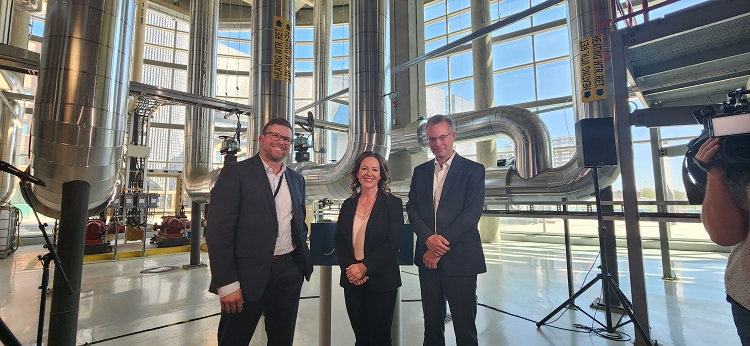
Jason Grabinsky, director of development and innovation, Calgary District Heating; Minister Rebecca Schulz; Justin Riemer, CEO, Emissions Reduction Alberta
Many industrial sectors require new technologies to lower emissions while also delivering the goods that Albertans and Canadians count on. These technologies are often still in development or not commercially available, making it hard for Alberta’s world-class industry to keep improving its environmental and economic performance.
Through Emissions Reduction Alberta, the Alberta government is making $50 million available to help industries, big and small, develop and commercialize the innovations needed to reduce emissions, diversify the economy and create high-paying jobs.
“We are helping develop, test and commercialize the technologies that companies need to stay competitive and attract talent while they drive innovation. The last industrial funding challenge led to more than a dozen ground-breaking projects, and I look forward to seeing even more impressive ideas this year.”
The Industrial Transformation Challenge focuses on scale-up, pilot, demonstration and first-of-their-kind commercial projects for use in the agriculture, forestry, industrial manufacturing, energy and other natural resource sectors. It will help these industries not only reduce emissions and waste, but also cut costs and stay competitive in global markets.
This is the second round of the Industrial Transformation Challenge. Last year, the government and Emissions Reduction Alberta funded 14 projects with the potential to reduce 700,000 tonnes of emissions by 2030. This included funding to help Calgary District Heating demonstrate new heating and thermal energy storage technologies, and Canadian Pacific Kansas City convert diesel-electric locomotives to hydrogen. It also included funding for ZS2 Technologies to transform how cement is made and used, and for Canadian Forest Products to develop new technologies using geothermal energy in forestry operations, among other projects.
“This annual offering demonstrates there is an ongoing opportunity to support Alberta’s natural resources and industrial sectors through the acceleration of transformative technology. Like several other technologies we have funded before, this $50-million Industrial Transformation Challenge will help accelerate the development and commercialization of some of the most promising innovations the province needs to reduce emissions and maintain competitiveness.”
This competition is open to a wide range of projects. For example, it could fund initiatives to help eliminate methane emissions, improve thermal energy storage, or reduce emissions in everyday agriculture and forestry operations. It could also include practical projects like fuel switching and electrification, critical minerals extraction and more.
“Government of Alberta funding through Emissions Reduction Alberta’s initial Industrial Transformation Challenge is helping District Energy lower the carbon footprint of Calgary’s thriving Rivers District and downtown core. This ongoing support shows a commitment from the province to enable resilient, reliable and sustainable thermal energy production.”
"Thanks to funding support from the Government of Alberta through Emissions Reduction Alberta’s first offering of the Industrial Transformation Challenge in 2023, Strathcona is well positioned to advance a post combustion carbon capture pilot. Support for this, and other industrial decarbonization projects, serves as an important example of how innovation and emissions reduction funding advances emerging technology.”
“The Government of Alberta and Emissions Reduction Alberta continue to work with industry to reduce emissions by investing in the testing and scale-up of new technologies. In the forest industry, Emissions Reduction Alberta has supported several projects that reduce emissions by capturing waste heat and reducing fuel requirements for transporting and processing wood. It is unlikely these projects would have occurred without this leadership and support.”
Successful applicants are eligible for up to $10 million per project, with a minimum request of $500,000. The deadline to apply is June 21. Applicants are invited to visit Emissions Reduction Alberta’s website for more information.
Quick facts
- Industrial Transformation Challenge applicants and their technologies can originate from anywhere in the world, but projects must be piloted, demonstrated or deployed in Alberta and show significant emissions reduction and economic benefits within the province.
- The successful projects will be announced in early 2025.
- To date, Emissions Reduction Alberta has committed $935 million in provincial funding toward 267 projects worth $8.8 billion. These are estimated to reduce 42.5 million tonnes of emissions by 2030.